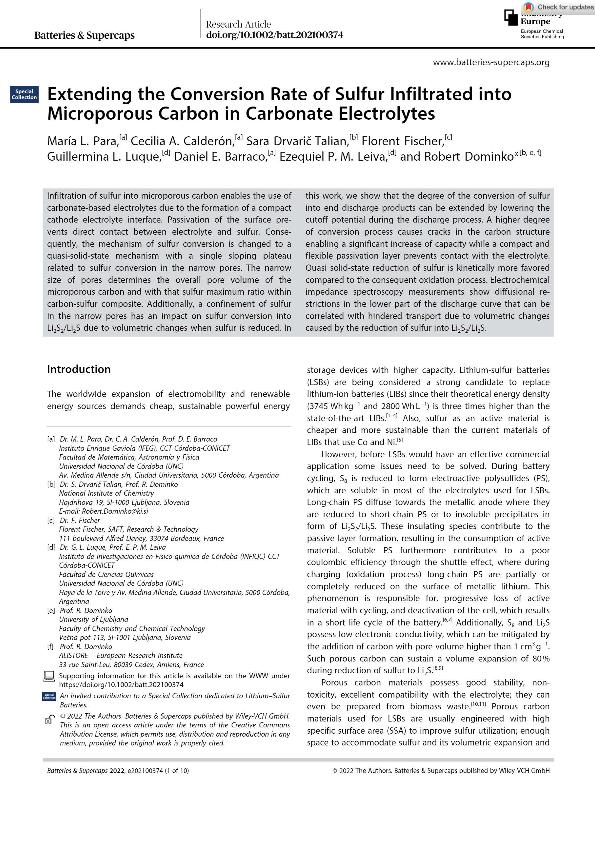Artículo
Extending the conversion rate of sulfur infiltrated into microporous carbon in carbonate electrolytes
Para, Maria Laura ; Calderon, Cecilia Andrea
; Calderon, Cecilia Andrea ; Drvaric Talian, Sara; Fischer, Florent; Luque, Guillermina Leticia
; Drvaric Talian, Sara; Fischer, Florent; Luque, Guillermina Leticia ; Barraco Diaz, Daniel Eugenio
; Barraco Diaz, Daniel Eugenio ; Leiva, Ezequiel Pedro M.
; Leiva, Ezequiel Pedro M. ; Dominko, Robert
; Dominko, Robert
 ; Calderon, Cecilia Andrea
; Calderon, Cecilia Andrea ; Drvaric Talian, Sara; Fischer, Florent; Luque, Guillermina Leticia
; Drvaric Talian, Sara; Fischer, Florent; Luque, Guillermina Leticia ; Barraco Diaz, Daniel Eugenio
; Barraco Diaz, Daniel Eugenio ; Leiva, Ezequiel Pedro M.
; Leiva, Ezequiel Pedro M. ; Dominko, Robert
; Dominko, Robert
Fecha de publicación:
07/02/2022
Editorial:
John Wiley and Sons Inc
Revista:
Batteries and Supercaps
e-ISSN:
2566-6223
Idioma:
Inglés
Tipo de recurso:
Artículo publicado
Clasificación temática:
Resumen
Infiltration of sulfur into microporous carbon enables the use of carbonate-based electrolytes due to the formation of a compact cathode electrolyte interface. Passivation of the surface prevents direct contact between electrolyte and sulfur. Consequently, the mechanism of sulfur conversion is changed to a quasi-solid-state mechanism with a single sloping plateau related to sulfur conversion in the narrow pores. The narrow size of pores determines the overall pore volume of the microporous carbon and with that sulfur maximum ratio within carbon-sulfur composite. Additionally, a confinement of sulfur in the narrow pores has an impact on sulfur conversion into Li2S2/Li2S due to volumetric changes when sulfur is reduced. In this work, we show that the degree of the conversion of sulfur into end discharge products can be extended by lowering the cutoff potential during the discharge process. A higher degree of conversion process causes cracks in the carbon structure enabling a significant increase of capacity while a compact and flexible passivation layer prevents contact with the electrolyte. Quasi solid-state reduction of sulfur is kinetically more favored compared to the consequent oxidation process. Electrochemical impedance spectroscopy measurements show diffusional restrictions in the lower part of the discharge curve that can be correlated with hindered transport due to volumetric changes caused by the reduction of sulfur into Li2S2/Li2S.
Archivos asociados
Licencia
Identificadores
Colecciones
Articulos(IFEG)
Articulos de INST.DE FISICA ENRIQUE GAVIOLA
Articulos de INST.DE FISICA ENRIQUE GAVIOLA
Citación
Para, Maria Laura; Calderon, Cecilia Andrea; Drvaric Talian, Sara; Fischer, Florent; Luque, Guillermina Leticia; et al.; Extending the conversion rate of sulfur infiltrated into microporous carbon in carbonate electrolytes; John Wiley and Sons Inc; Batteries and Supercaps; 5; 5; 07-2-2022; 1-11
Compartir
Altmétricas



